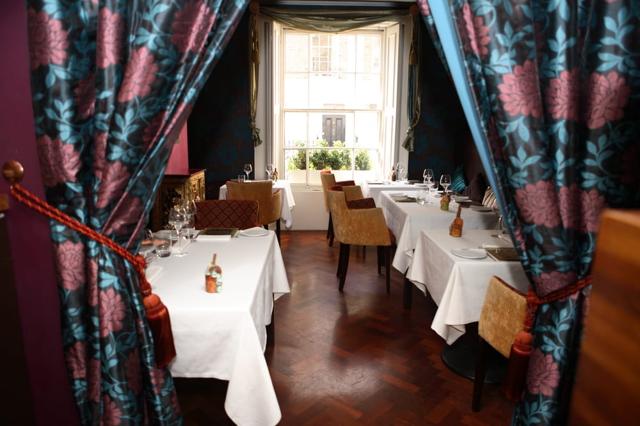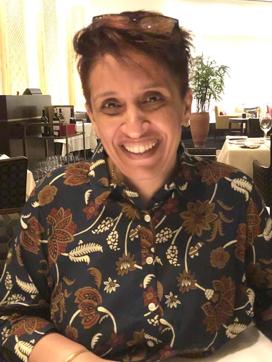I have been trying to work out who the world’s first Indian celebrity chef was. My guess is that it was Vineet Bhatia. The London restaurant where he worked, Zaika, was the first Indian restaurant anywhere in the world to get a Michelin star. (I think Tamarind got one the same year; Atul Kochar was the chef at Tamarind then.) Zaika was owned by Claudio Pulze, one of London’s top restaurateurs, who also owned Aubergine (where Gordon Ramsay won his first Michelin stars). That Pulze should open an Indian restaurant and bracket it with his upmarket French restaurants was regarded as a breakthrough for Indian food; finally the cuisine was being treated as being on par with the best and the ethnic tag that haunted Indian food in the UK had faded.
There were other upmarket Indian restaurants in London, of course, but they tended to be owned by Indians: The Mathranis/Panjabis had Chutney Mary, the Taj owned The Bombay Brasserie, the Khannas ran Tamarind etc. They were seen, essentially, as attempts by Indians to take our cuisine to a higher level.
Pulze’s involvement in Zaika suggested that Indian cuisine had entered the mainstream at the top of the market and Vineet was written about and feted extensively. It helped that, by this time, he knew London well.
He had started out at Kandahar at The Oberoi, Mumbai, given it up and flown off to London with just seven pounds in his pocket --- he had to take the Tube when he landed at Heathrow because he could not afford a cab. He spent five years at Star of India, one of London’s oldest Indian restaurants, which zoomed to the higher reaches of the market when he cooked there. Then, he opened his own, highly regarded, place in Hammersmith but had to abandon it when he fell out with his partners.
The Zaika job, with its profit-sharing arrangement, gave him the kind of profile that no Indian chef had ever enjoyed in London. Pulze let him act as Chef/Patron and marketed the restaurant on the basis of Bhatia’s name. For many years after Zaika’s Michelin-starred success, Vineet was the only Indian chef that most Londoners had heard of.
Eventually, he built on this reputation to open his own restaurant, Rasoi, which also won a Michelin star and then set up an empire of global consultancies. Some of the Vineet Bhatia-linked restaurants were in the Middle-East but the two that won the most acclaim were in unusual locations. His Mauritius outpost become justly famous and when Mandarin Oriental took over the old Hotel Du Rhone in Geneva and upgraded it to Mandarin standards, they talked to Vineet about opening a restaurant there.
Within Mandarin Oriental, many people thought this was madness: Geneva has no tradition of Indian food. The hotel was more hopeful of its other restaurant which was run by Paul Bocuse. But, against the odds, it was Vineet’s restaurant that took off. When the Michelin stars were announced, Vineet won another star for the Geneva restaurant.
Since then, the Bhatia empire has grown. There are now a dozen consultancies around the world. He even came back in triumph to the Mumbai Kandahar which they turned into a Vineet Bhatia restaurant and renamed Ziya.
Most Indian chefs who have succeeded abroad find the going tough when they open in India. Not Vineet. The Oberoi is making money from Ziya and is delighted that it took a gamble and handed the restaurant over to him --- a decision that originally evoked as much internal debate within the Oberoi group as the Geneva restaurant did with Mandarin Oriental.
There have been reverses too. He closed down his London flagship, took on new backers and re-openered with a flourish. Michelin was delighted and the restaurant got a star. But there were problems with the backers and the restaurant closed just weeks after the Michelin stars were announced.
It doesn’t really matter to Vineet financially; he has a dozen other restaurants. But you get the sense that because London is where he made his reputation, he feels the urge to go back and show a new generation of London Indian chefs how it is really done.
I did not know Vineet when he was in India, nor did I ever go to Zaika, even when the hype surrounding the restaurant was at its highest pitch. This was not because I had anything against him. It was simply that most London Indian restaurants bore me --- and it is a long way to go to eat Rogan Josh, even if they pour the gravy over the shank and make a song and dance about the presentation.

But Rasoi received such rave reviews that I decided I had to go myself. It is no exaggeration to say that I was blown away by his tasting menu. In those days, over a decade ago, London Indian food was about presentation and not about flavour. But Vineet’s food was more than tasty: it showed flair and imagination.
Over the years, many of the dishes that we have now came to associate with modern Indian food were created by Vineet. It was his idea to turn naans, long regarded as a side-dish, into the stars of the meal. The blue cheese naan and the mushroom/truffle naan are Vineet inventions. So is the idea of using an ice-cream machine to change the texture of familiar flavours. The most famous example is the makhni sauce ice-cream but at Ziya he does a great dahi balla ice-cream. Though he never gets much credit for this, his kheer ice-cream is also brilliant.
Then there is the chocolate samosa, his most copied signature dish.He was the first chef I know of to make khichris (rather than risottos) with unusual flavours and pair them on his plates with meats.And there are the flavour combinations: grated chocolate on lobster or coffee on kababs. Sometimes it is hard to remember that Vineet started all this: the dishes have been so influential that often younger chefs who toss off variations, do not recall that Vineet was the original inventor.
You can’t really copyright or patent recipes so Vineet is philosophical about the imitation though I sometimes feel that he made the transition from good chef to globally famous celebrity chef too fast. In the process, people focussed on the fame but missed the seminal contributions to the advancement of our cuisine.
A curious lack of ambition and an unwillingness to show off are Vineet’s most surprising characteristics. I doubt very much if his empire would have grown had it not been for Rashima, his wife, who manages both his career and their lives together.

They met through an ad in the matrimonial columns and perhaps unusually for two people who were part of an arranged marriage, quickly became two halves of the same whole. Rashima, who had no catering background, first started looking after the front of the house at his restaurants and then, starting handling Vineet’s financial affairs. She was the one who told him that as celebrated as he was at Zaika, he needed to get out and open his own restaurant if he hoped to make any money.
It is Rashima who looks after the business, oversees the expansion and is far more ambitious for Vineet than Vineet is himself. It is an arrangement that he is happy with. He has never understood money and shies away from confrontation. Perhaps as a consequence Rashima has taught herself to be the tough, disagreeable one who will fight corporate collaborators and the managements of hotels where Vineet has restaurants. Nearly everyone who has dealt with the couple is a little scared of Rashima, which is how they want it.
The bond between them is deep and they are obviously very in love. Some years ago, at a chef’s conference, I was interviewing Vineet on stage and we talked about how Rashima had pawned her jewellery to get the money Vineet required to open his restaurant when suddenly, without any warning at all, Vineet burst into tears. We had to pause till he composed himself again before we could resume our conversation. I suspect Rashima is as emotional though she hides it behind an air of aggression.
The Bhatias are now at the stage where there are few mountains left for them to climb. The mess in London endures and I imagine that their top priority is to sort it out and open again. But apart from that, it is hard to see how Vineet can top what he has already achieved. Rashima talks about consulting for three more international restaurants (“fifteen is a much better figure than twelve”) and she is constantly evaluating the offers that keep pouring it.
As for Vineet, I think he is happy just cooking. At dinner at Ziya, he served me a meal that was radically different from the first meal I had eaten at Rasoi all those years ago. This food was meant for sharing, the flavours were sharper and it reflected influences from a newer India: a street food dish from Indore, a fun take on Indian-Chinese chilli chicken and an uttapam with prawns, for instance.
It is rare for a chef of Vineet’s standing to rethink his food at this stage of his career. But Vineet never stops travelling, never stops picking up ideas and his food just keeps getting more and more interesting. As does Vineet himself.



